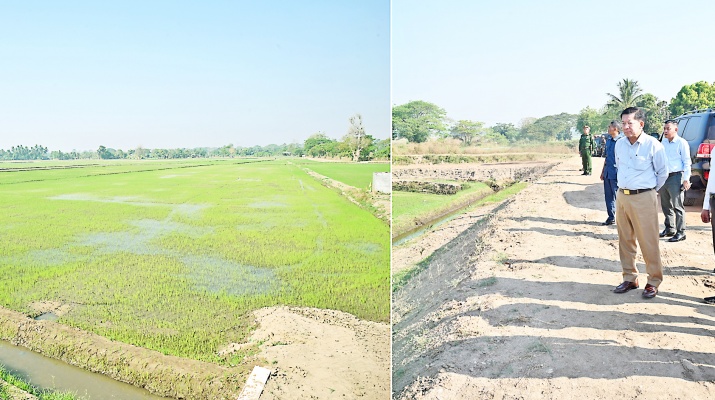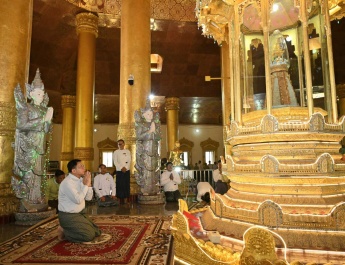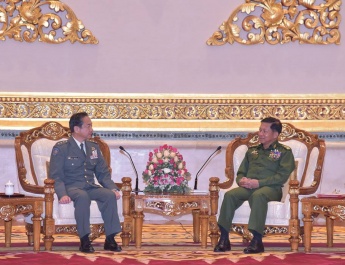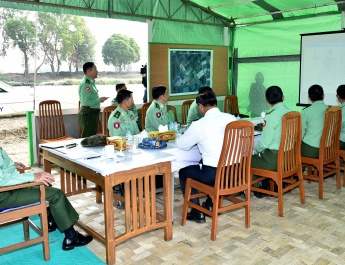NAY PYI TAW March 12
Chairman of State Administration Council Prime Minister Senior General Min Aung Hlaing, accompanied by SAC Joint Secretary General Ye Win Oo, SAC members, union ministers, the Nay Pyi Taw Council chair, the Nay Pyi Taw Command commander and officials, inspected progress in conducting agricultural activities in Zeyathiri and Tatkon townships, Nay Pyi Taw Council Area this morning.
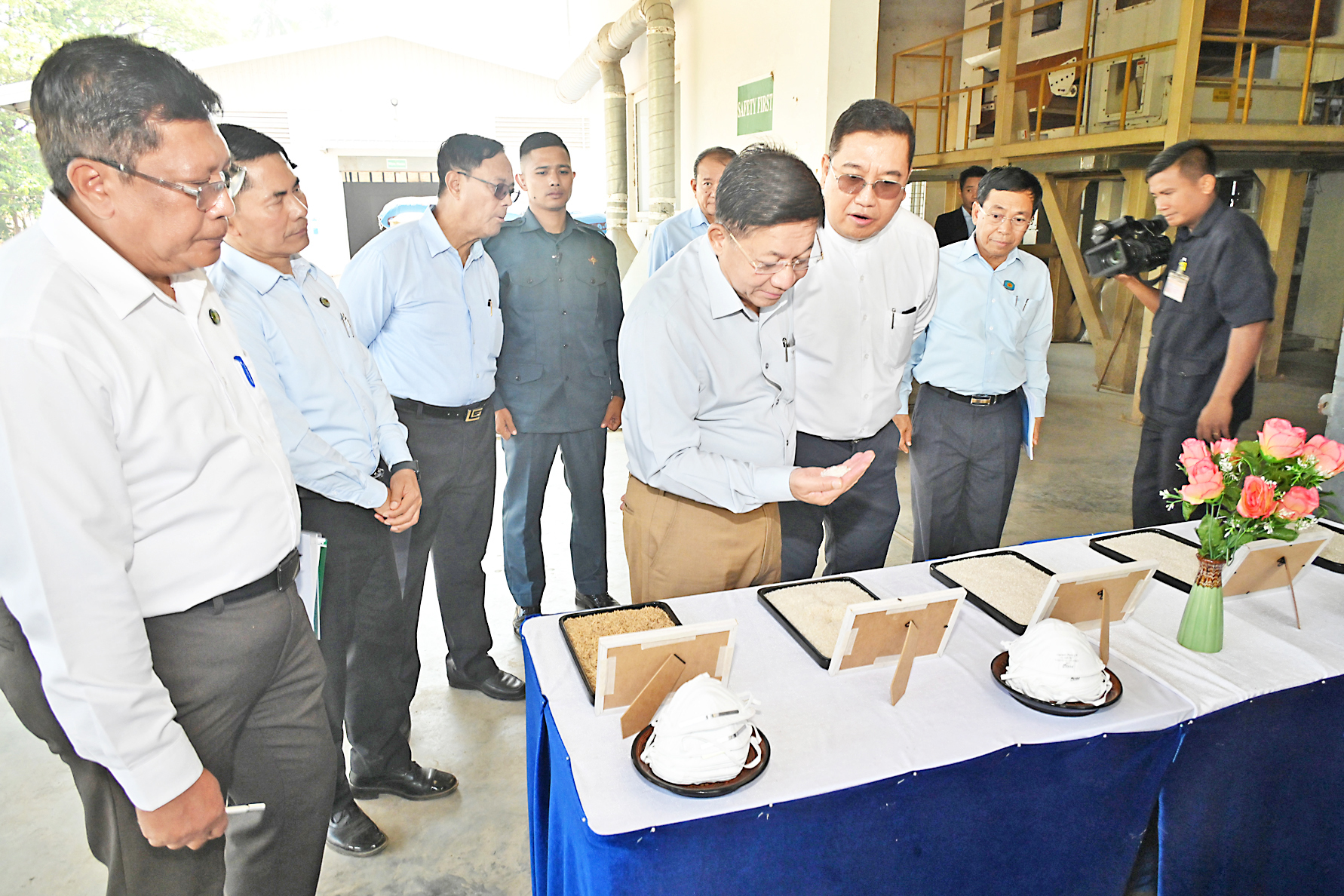
Land reclamation for mechanization farming On arrival at the land reclamation project for mechanized farming near Pinlaung junction, Aungzeya, Mautaw, Thethnininn village tracts in Zeyathiri Township, the Senior General and party heard a report on implementation of the project, points of the project, inclusion of feeder canals and production roads, possibility of triplecropping in the area where only monsoon crops could be cultivated, thanks to the project presented by Union Minister for Agriculture, Livestock and Irrigation U Min Naung and officials at the briefing hall.
In response, the Senior General said although the mechanization farming project needs a large amount of capital, it is highly promising and it promises individual and national benefits. Hence, performance must be enhanced in realizing the farm mechanization project which must be extended to reach all parts of the country.
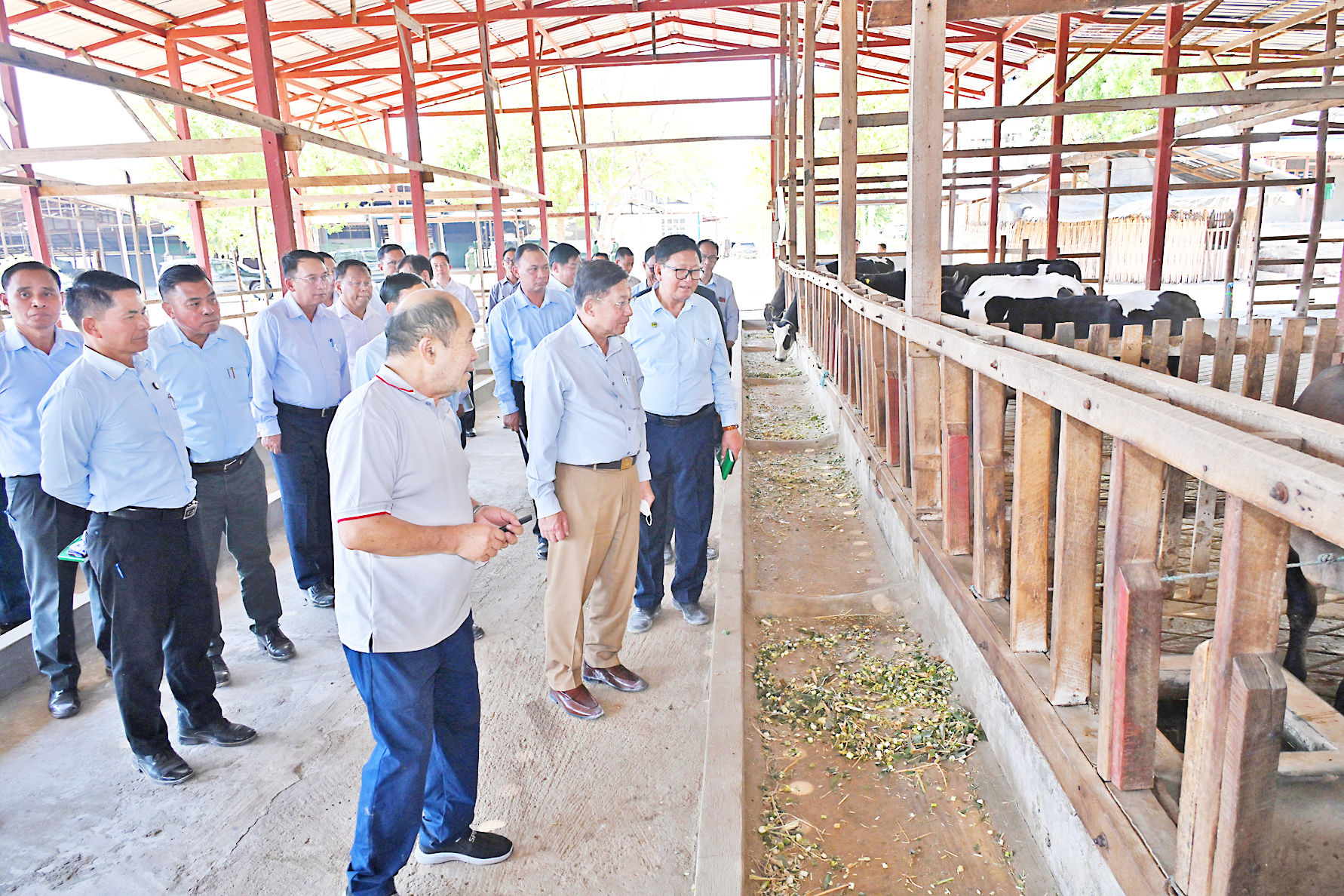
The benefits of mechanized farming must be made known to the farmers. As the saying goes “A good start promises a better future,” the project covers the task of systematizing crops lands, reclaiming land for mechanized farming, preparing land with machines for achieving long-term benefits.
In accord with the most basic means of agriculture – seeds, soil, water and technology – land must be systematically prepared, and quality strains, irrigation water must be available and correct methods must be applied to realize the target.
The recently materialized mechanized farming project must be an ideal one, with systematic records on cultivation and output. The number of plants per acre must hit the target in cultivating any kind of crop.
Rural people are the majority of the country’s population and they are in the farming business.
Hence, their socio-economy must be improved. He also looked into the requirements of other issues.
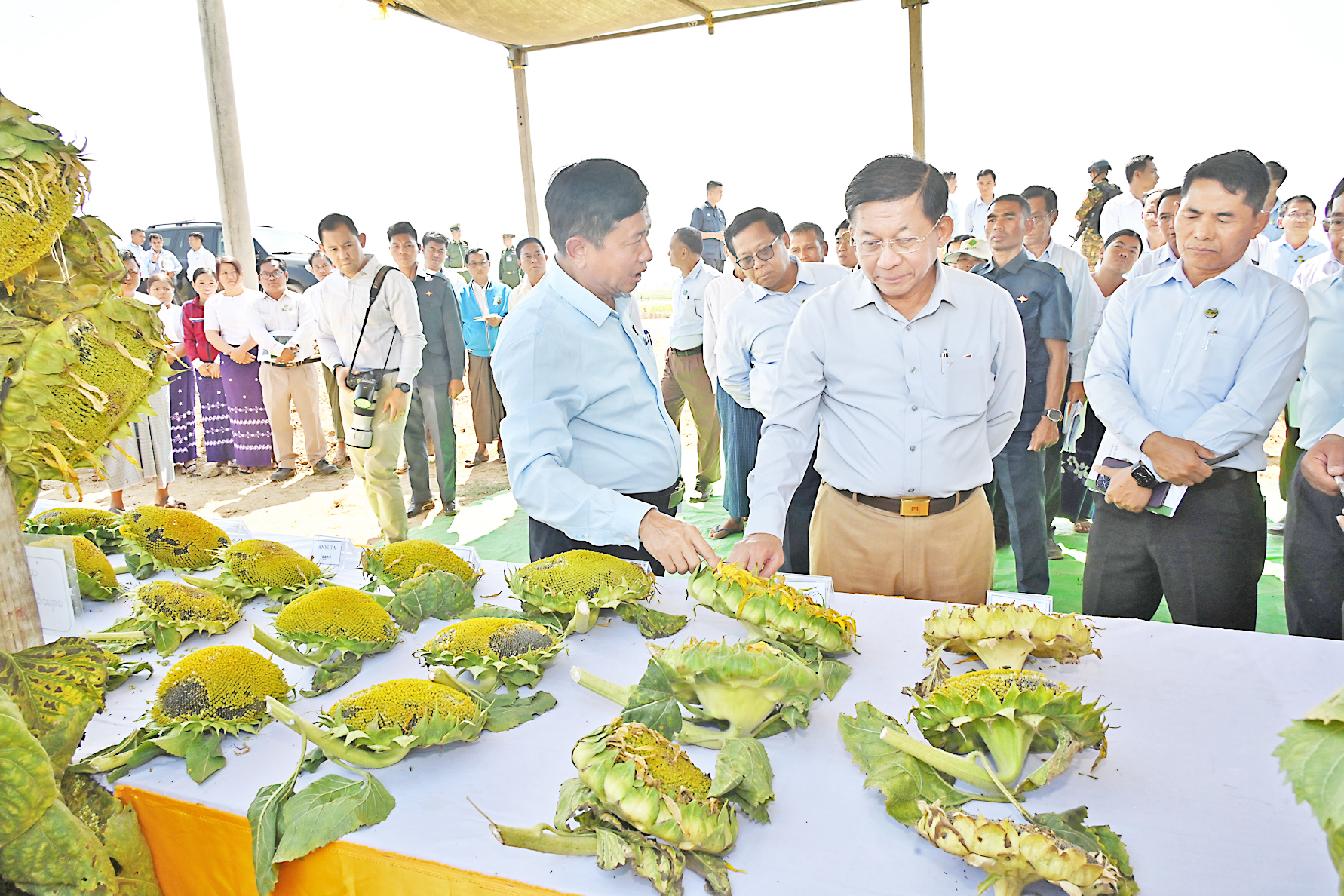
The Senior General and party observed the systematically reclaimed land for mechanized farming, mechanized paddy cultivators at work and paddy fields in the project area and attended to the needs presented by officials.
Myanmar-Korea advanced rice mill The Senior General and members then visited the Myanmar- Korea Advanced Rice Mill in Sein Sar Pin Village, where they were welcomed by the facility’s supervisor, U Aung Zaw Oo, and other officials.
During the visit, the officials provided an overview of the milling process and the production of local rice varieties.
Then, in the meeting hall of the rice mill, the Director General of the Department of Agriculture, along with officials from the Ministry of Agriculture,
Livestock and Irrigation, provided an explanation on several key topics. These included the brief history of the establishment of the Myanmar-Korea Advanced Rice Mill, its capacity to store and mill locally produced rice, the conditions for distributing the rice produced, the conditions under which cooperatives can operate rice mills collectively, as well as the advantages and challenges faced by these cooperatives.
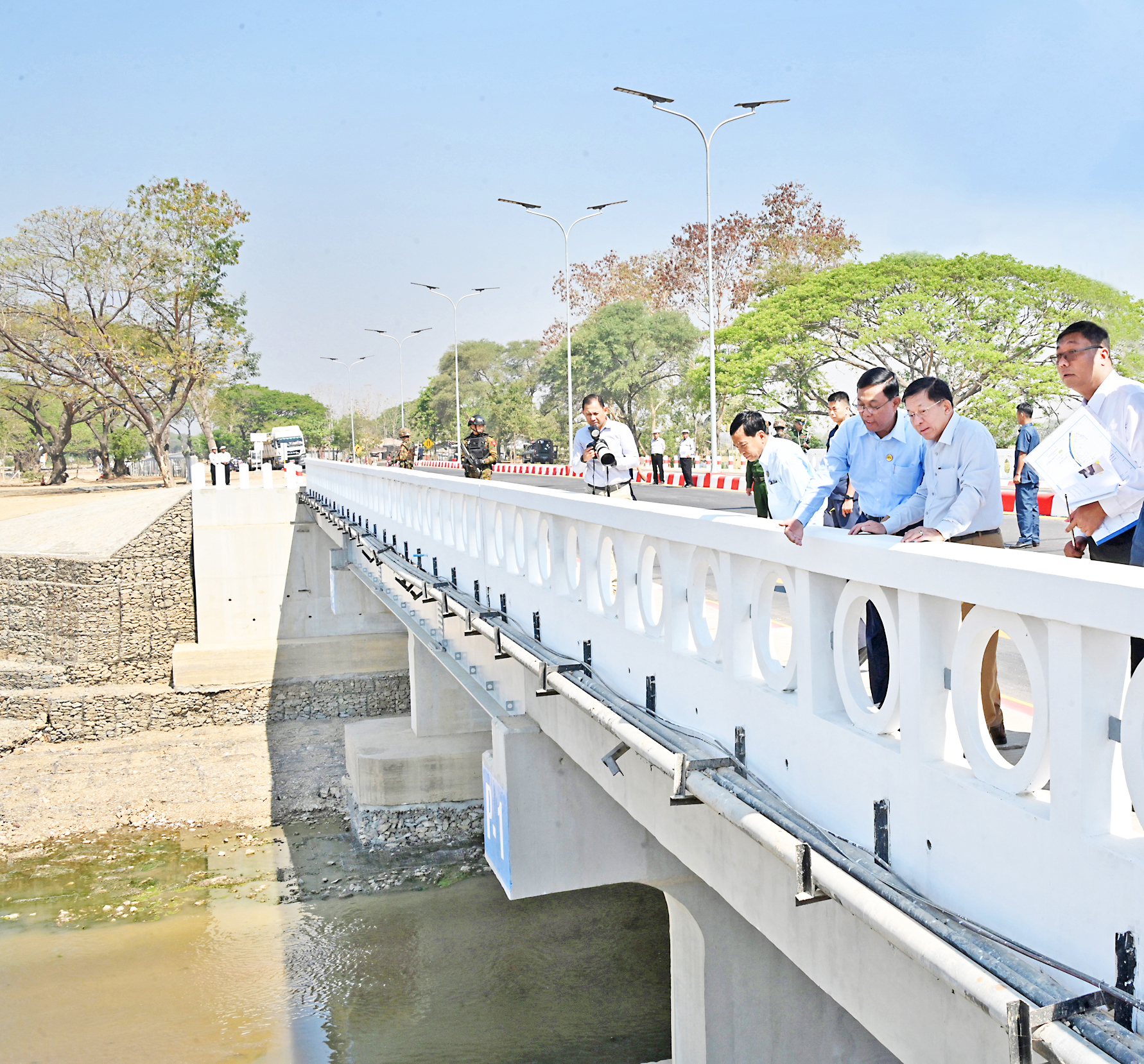
The officials also outlined the steps to be followed moving forward.
In response to the presentations, the Senior General emphasized the need for high-quality rice that is both consumable and marketable.
He called for the cultivation of more rice with good eating quality and marketability and urged efforts to secure a place for Myanmar’s famous Paw San Mhwe rice in the global market, along with addressing other essential matters.
Sustainability Work on Nawin Chaung Bridge (Asone) Underway The Senior General and members arrived at Nawin Chaung Bridge (Asone) to inspect the ongoing work on the 4-lane extension, which is being built following the collapse of the bridge in September 2024 due to continuous rain and erosion.
Current efforts are focused on river straightening, constructing retaining walls, and dredging the waterway near the bridge approach to ensure its longterm stability. Then, the Senior General provided necessary guidance to the Union Minister of Construction based on the submissions.
Status of Operations for the 80-Acre Winter Sunflower Plantation The Senior General and members then visited the 80-acre winter sunflower plantation managed by the Ministry of Agriculture, Livestock and Irrigation, Department of Agriculture, in Shawkone Village, Tatkon Township. Officials provided an overview of the successful cultivation of winter crops and summer paddy on farmland near Shawkone Village, which had been damaged by Typhoon Yagi in September of the previous year.
They also highlighted the planting and successful development of the Yezin hybrid sunflower-1 variety in the winter sunflower plantation.
In response to the presentations, the Senior General emphasized that, as our country relies on importing edible oil every year, efforts must be made to ensure the success of oil-seed crops.
He stated that achieving the target for oilseed crops, including sunflowers, will also lead to a decrease in edible oil prices.
He emphasized the need for successful implementation of sequential cropping and achieving good yields and greeted local farmers warmly.
Kangyi Livestock Zone The Senior General and members of the delegation visited the Kangyi Livestock Zone in Kangyi Village, Tatkon Township.
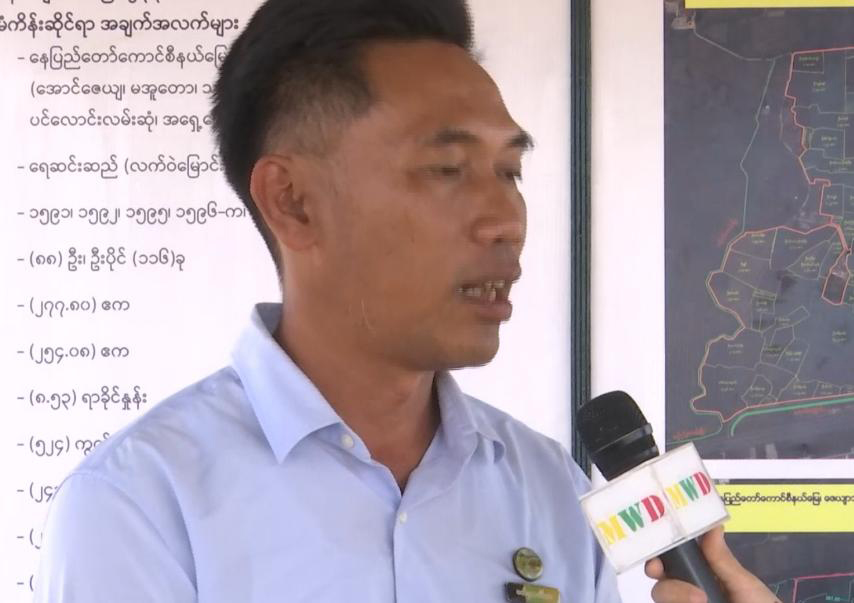
During the visit, Nay Pyi Taw Council Chairman U Than Htun Oo provided an overview of the implementation of the Kangyi, Shwe Myot, and Pyaunggaunggyi livestock zones within the Nay Pyi Taw Council area and also explained the adherence to specified standards in each zone and the ongoing efforts to develop and enhance livestock activities.
In response to the explanations, the Senior General stated that he has set two national programs aimed at creating a prosperous country with abundant food and water resources while ensuring complete nutrition for all citizens.
To achieve this, agricultural and livestock zones are being established to promote regional self-sufficiency in meat, fish, eggs, and vegetables. The priority is first to ensure local sufficiency, followed by national sufficiency, and then expand to exports.
With approximately 30 percent of the population living in urban areas, it is essential to provide adequate meat, fish, and eggs for their consumption. At the same time, rural residents, who already engage in local livestock farming, need to adopt systematic and efficient practices.
To achieve this, population- to-meat consumption ratios must be calculated at the regional level, determining daily, monthly, and annual requirements.
Systematic livestock management should be implemented accordingly. Beyond the Nay Pyi Taw Council area, all states and regions must assess their food sufficiency needs and develop structured livestock programs.
With State support available, it is crucial to successfully establish regional livestock zones and achieve national meat sufficiency.
Our country already has a strong foundation for successful agriculture and livestock activities, supported by a robust market.
Efforts should focus on increasing the production of agricultural, livestock, and agriculture-based industrial products. Enhancing livestock production in each zone will help meet domestic demand, while surplus products can be exported as raw meat.
Additionally, MSMEs can process and export finished products.
Other necessary instructions were also provided.
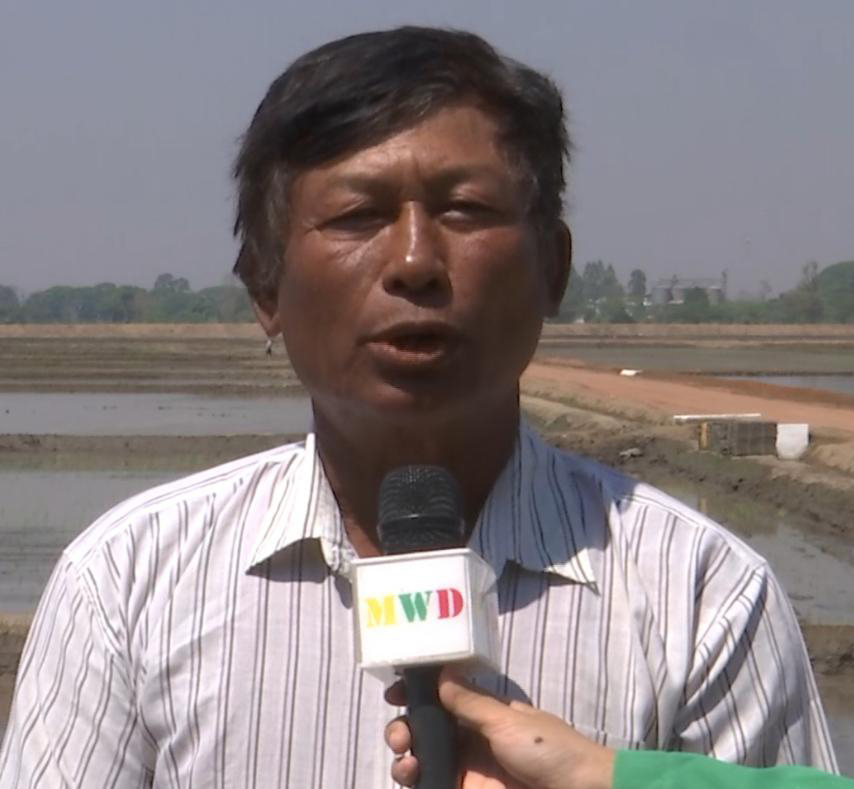
The Senior General and members inspected the livestock operations at U Tin Myaing’s pig farm, U Myat San’s broiler and layer poultry farm, and U Twan Khin Win’s dairy and beef cattle farm in the Kangyi Livestock Zone and gave necessary instructions based on the officials’ presentations.
An official and a farmer also shared their views on the industrial farming land development project near the Pinlaung intersection in Zeyathiri Township, Nay Pyi Taw Council Area.
As the responsible organization, the systematic land reclamation team (Upper Myanmar) under the Department of Industrial Development, located in Leway
Town, is carrying out the tasks using departmental machinery and staff. The project began on December 17, 2024, and was completed by February 28, 2025. Currently, farmers are preparing to cultivate summer paddy on the reclaimed lands.
As of today, about 100 acres have been planted, and preparations are underway to cultivate the remaining 170 acres.
Agricultural machinery is available yearround, ensuring timely harvesting and transportation, which will lead to high-quality crop yields.
The fields are expansive and flat, reducing water usage compared to before. Wide fields allow for full utilization of agricultural machinery, reducing fuel consumption. Additionally, the inclusion of access roads enables agricultural machinery to operate anytime, allowing farmers to expand from single to double or triple cropping.
The shift to mechanized farming reduces the need for agricultural labour, enabling surplus workers to be redirected to other national development projects.
The benefits of land reclamation provided by the state are significant. Previously, I had about 14 plots of farmland, but now I have only 4 plots. Water management has also improved significantly. Before, we had few water sources, but now, thanks to state development efforts, we receive water directly from the canals.
These projects greatly benefit all farmers.
The inclusion of a water pumping system ensures everything runs smoothly. On behalf of all farmers, I would like to express our deep gratitude to the state for providing these developmental supports free of charge.


